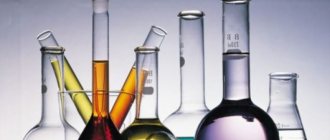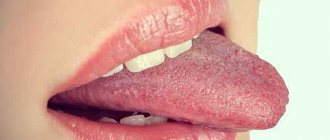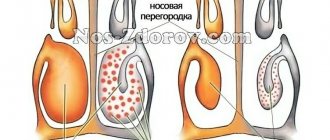With a first-degree burn of the tongue, slight redness and swelling of the mucous membrane occurs. This injury can occur when drinking too hot drinks or food. In this case, treatment comes down to pain relief and rinsing the mouth with antiseptic solutions. A second degree burn is characterized by the appearance of blisters. Such cases require medical intervention, which, as a rule, consists of prompt opening of the bubbles and subsequent treatment of the damaged surface with antiseptics.
Third- and fourth-degree tongue burns are characterized by tissue necrosis. These serious and very painful injuries occur when the tongue is exposed to high concentrations of chemicals. When burned by alkalis, the tissues acquire a gelatinous consistency; when damaged by acids, they become covered with a brown, yellow, green, white or brown crust.
Chemical injuries to the tongue require immediate first aid.
After prolonged washing with water, the aggressive agent is neutralized with a special solution.
Depending on the substances that caused the burn, a solution of soda, acetic acid, ammonia, sodium bicarbonate, sodium chloride, etc. can be used. It should be remembered that rinsing with water is strictly prohibited for burns caused by organic compounds of aluminum and quicklime.
It is recommended that the affected person administer an antihistamine and pain reliever, rinse the mouth with a local anesthetic and lubricate the tongue with sea buckthorn oil or fish oil. Without timely assistance, tissue scarring will begin, traces of which can only be removed surgically. Treatment and rehabilitation of victims in this case are carried out in a hospital setting.
Causes and mechanisms
Here are just a few examples of when you can get a thermal injury to the tongue. In real life there are many more reasons.
The tongue can be injured by careless handling of chemicals, as a result of irradiation, or by exposure to electric current. Therefore, burns are distinguished by the type and severity of the damage received.
There are four main reasons that provoke a burn injury to the tongue:
- thermal injury caused by high-temperature food or drinks, hot steam and fire entering the oral cavity;
- chemical damage caused by toxic substances of chemical origin;
- electrical burn resulting from exposure of the tongue to electric current of varying strength;
- radiation injury of the tongue caused by exposure to radiation.
The level of severity of the burn injury received can be represented by four degrees, which differ in symptoms, which affects the regimen of prescribed therapy.
Description and causes of injury
Burns to the tongue are most often caused by boiling water, tea or food, steam, touching hot objects, or exposure to high temperatures. Chemical burns of the tongue are less common in medical practice. In this case, the mucous membrane is affected by acids or alkalis. Typically, such injuries are observed in young children or during suicide attempts.
The special risk group includes children of preschool age and people suffering from visual impairments!
Experts, depending on the severity and depth of tissue damage, distinguish the following degrees of burns:
- Mild degree - characterized by slight swelling and redness (the tongue becomes bright pink). The symptoms go away on their own and no special treatment is required.
- Medium - a red spot appears on the tongue, bubbles filled with translucent liquid (which can be seen in the photo).
- Severe – characterized by multiple ulcerative lesions of the mucous membrane and pronounced pain. Partial necrosis of damaged tissue is possible.
This injury is quite painful, especially with chemical injuries, and therefore requires timely assistance to the victim and competent treatment.
How does it manifest?
The symptoms of this injury depend on its severity and the causes of the injury. In general, doctors identify the following clinical signs characteristic of a tongue burn:
- Redness;
- Swelling and hyperemia;
- Soreness, with a tendency to intensify during meals;
- Specific white coating;
- Decreased sensitivity, numbness, loss of taste.
Often victims complain of acute pain, difficulties with the process of eating food, and the inability to distinguish taste. The pain syndrome can be very severe, so it is important to be able to promptly provide first aid to the victim and carry out further competent treatment. If there are clinical signs characteristic of second and third degree lesions, you should definitely consult a doctor!
First aid measures
What to do if your tongue is burned? It is necessary to eliminate the provoking factor as soon as possible. For these purposes, the tongue is washed with cold, clean water. After this, the victim should be given a cool drink to drink. Cold yogurt, fruit ice cream, and jelly help to eliminate painful sensations and soothe injured mucous membranes. For the purpose of disinfection, it is recommended to treat the affected area with an alcohol-free antiseptic solution.
In case of a chemical burn, the first thing to do is to thoroughly and intensively rinse the mouth with clean, cool water to neutralize the effect of the irritant, and then rinse the stomach. In case of severe pain, give the patient an analgesic.
Further treatment should be prescribed by a qualified specialist after a preliminary examination of the victim and determination of the severity of the injury!
Causes and types of tongue burns
There are the following types of burns:
Now it’s easy to understand what to do if you burn your tongue right at home in the kitchen, since the cause can be determined on the spot. All burns of the oral cavity are divided, as already noted here, into the following subgroups: thermal, electrical, radiation and chemical injuries.
According to the degree of severity in medical practice, four forms are also distinguished:
- The first degree is considered the easiest, when the surface of the tongue swells slightly and becomes bright red;
- in the second form, the damage is already more significant: the appearance of watery, rather painful blisters is noted;
- more severe changes are observed in the third degree: the tongue becomes covered with ulcers, sometimes necrotic areas are noted;
- and the last, most severe fourth form of burn is characterized by irreversible phenomena, often incompatible with life - complete or partial charring of the organ.
Causes
A burn can occur in different situations and for different reasons. The most common thermal burns of the tongue occur due to incorrect assessment of the temperature of food and drinks, as well as steam during inhalation.
In infants, burns occur due to the carelessness and inattention of parents who prepared too hot a formula for feeding. A chemical burn occurs when any substance gets into the oral cavity - alcohol, alkali, concentrated acid. Injuries often occur when medications are taken incorrectly.
Kids often taste aromatic liquids in bright jars, which leads to sad consequences.
Severity
To understand what to do if you burn your tongue, you need to understand how serious the injury is.
There are 4 degrees of severity:
The scale and depth of violations of the integrity of the tissues of the tongue make it possible to correctly assess the degree of injury received by the victim:
- the first degree is accompanied by minor disturbances, mild swelling and mild hyperemia;
- the second degree is characterized by the formation of blisters with transparent or slightly yellowish contents;
- the third degree is characterized by the formation of ulcerations and tissue necrosis, with severe pain.
The most severe injury is the fourth degree, manifested in the form of partial or complete charring of a significant part of the tongue.
Note! According to medical statistics, about 2/3 of the total number of victims of tongue burns are children of preschool or early school age who are injured due to inattention and non-compliance with safety rules.
Folk remedies for thermal burns of the tongue
The first thing you want to do immediately after getting injured is to cool the injured area. You can use a piece of ice for this. It should first be moistened in water.
Attention! Do not apply dry ice or cold metal utensils - they may stick. If you do not have the opportunity to apply ice, then you can simply slowly drink cold water, non-acidic juice or compote. You can also apply yogurt to the burned area or drink cold milk. They relieve burning and pain.
Sugar or powdered sugar works the same way. A small amount is sprinkled onto the surface. These products saturate the surface with nutrients, accelerating the healing process.
Honey will slow down the inflammatory process and reduce pain. When taken, swelling and redness of the surface are eliminated. The natural product also helps to launch the process of cell regeneration, accelerating healing. To do this, you need to apply it to the burned area twice a day. Honey is contraindicated for children under 1 year of age. It can cause an allergic reaction or cause botulism.
A weak saline solution is prepared from 1 teaspoon of salt mixed with 200 ml of clean warm water. It is necessary to rinse with the solution 5 times a day until complete healing. Salt kills pathogens and fights infection.
An oil solution of vitamin E is widely used among cosmetologists. It has earned its popularity due to its medicinal properties, as well as the launch of the regeneration process at the cellular level.
Aloe juice is an alternative medicine that is used in most cases.
Aloe juice or leaf pulp is a recognized alternative medicine that is used in most cases. It eliminates painful feelings, relieves swelling and speeds up healing. It tastes unpleasant, but for the sake of a speedy recovery, it is used 2-3 times a day.
Fresh mint leaves, menthol gum, or candy are cooling and soothing.
Signs of a tongue burn
The general symptoms of a burn injury vary depending on the type of damaging factor, as well as the age characteristics of the patient and the severity of the injuries:
- disorders affecting the upper layers of the surface of the tongue - burning sensation, mild soreness, swelling and redness;
- injuries to the tissues located under the mucous membrane - a noticeable feeling of pain and burning, the appearance of small blisters and noticeable hyperemia, impaired taste;
- a severe burn affects the deepest layers, causes a pronounced feeling of pain, is accompanied by the appearance of perforation in the tongue, a feeling of numbness and noticeable necrotic changes.
Symptoms may also include a bloody, bitter or metallic taste, dryness, or increased salivation. The most severe injuries are dangerous to the health and life of the patient, so their treatment is carried out exclusively in a hospital setting.
A visual medical examination, as well as a survey of the victim, allows you to determine the degree of damage and correctly designate a scheme of therapeutic measures. In some cases, it is necessary to exclude a combined burn injury, so additional studies are prescribed.
Degrees of burns
In addition to the types of burns, depending on the source of exposure, damage is divided into several degrees. Each of them has different symptoms:
Degrees of burns
- First degree. In addition to a strong burning sensation, slight swelling is observed, and the surface of the tissue becomes red.
- Second degree. In addition to the signs described above, blisters appear on the tongue with a second-degree burn.
- Third degree. Severe tissue damage, in which ulcers occur, in some cases even necrotic processes are possible.
- Fourth degree. The damage is irreversible; the injury leads to complete or partial loss of the organ.
For burns more severe than first degree, you should consult a doctor as soon as possible, since you cannot get rid of the consequences on your own.
The extent of the damage can be clearly seen in many photographs.
On a note! Healthy foods for women over 40
Symptoms
Before considering methods of alleviating the condition, you should look at the clinical picture. The appearance of a burn on the tongue is difficult to miss. The main symptoms will be:
- Feeling of burning and numbness.
- Decreased taste.
- Pain.
- Dry mouth.
- Unpleasant taste (metallic, salty).
- Redness of the mucous membrane, its swelling, smoothness of the papillae.
MORE ABOUT: What to do if a nerve is pinched in the lower back?
How to relieve pain if a nerve is pinched in the back under the shoulder blade and between the shoulder blades. Ointment for back pain It all depends on the intensity of the damage. And it, in turn, is determined by the strength of the aggressive factor and the duration of its effect on the mucous membrane. Burns come in several degrees:
It is clear that the symptoms depend entirely on the severity of the injury. Therefore, if your friend just burned her tongue with hot tea, it’s not difficult to decide what to do. Such damage causes a burning sensation and minor pain. It's a little unpleasant, but tolerable.
In the second degree, pain symptoms increase, the patient experiences difficulty drinking, not to mention eating even light food. Severe injuries are rare.
They can cause painful shock. A person who has received a severe burn experiences excruciating pain that spreads to the entire oral cavity and larynx.
What to do if your tongue is burned - how to treat and relieve pain
Anyone can get burned by hot tea or any other drink. After such an incident, taste perception is disrupted, and discomfort arises, which you want to get rid of as quickly as possible. But not everyone knows what to do if the tongue is burned by boiling water or a chemical substance. Moreover, many actions are prohibited, as they can lead to even more disastrous consequences.
In everyday life, people more often encounter thermal burns of the tongue, which occur when drinking hot tea, coffee and food. But there are other types of burns:
- Chemical – in contact with aggressive chemicals and chemicals.
- Electrical – when the taste organ is damaged by electric shock.
- Radiation – when exposed to radiation.
Mild thermal injuries that occur without complications can be treated at home. Extensive thermal, as well as chemical, electrical and radiation burns of soft tissues in the oral cavity can lead to very dangerous consequences, and therefore should be treated under the supervision of a doctor.
In addition to temporary or irreversible loss of tongue sensitivity, impaired taste perception, burns are fraught with the development of glossitis - an infectious inflammation. Possible problems with digestion and disturbances in the functioning of internal organs. Without urgent medical care, death may occur due to blood loss, painful shock, and dysfunction of vital organs.
Degrees of burns on the tongue: symptoms and photos
Depending on how badly the soft tissue is damaged, the following degrees of burns are distinguished:
Degree and photoSymptoms
| I degree | Mild swelling, slight redness, burning and mild pain. |
| II degree | Swelling, redness, appearance of watery blisters. The pain is more severe and interferes with talking, drinking, and eating. |
| III degree | Swelling, redness and ulceration of the surface, in some places necrosis may be observed, as in the photo. Accompanied by severe pain. |
| IV degree | Charring and irreversible pathological changes in tissues that are life-threatening. |
Last degree burns can cause painful shock. The lesion can spread to the entire surface of the mouth and throat. Possible state of panic.
If the chemical that caused the burn enters the digestive tract, abdominal pain may occur.
With an electrical injury, typical pain may be absent, but convulsions, breathing problems, and fainting are possible.
With a radiation burn, bleeding of the oral mucosa is observed, cracks appear in the tongue, dry mouth appears, and lymph nodes swell.
How to treat a burned tongue
The choice of first aid method depends entirely on the type and extent of the injury. For the most common mild thermal burns, the following actions are possible:
- Dissolving ice cubes previously soaked in water helps relieve pain and burning. You can use pure frozen water or popsicles, or simply rinse your mouth with cold water. If there is no water, you can cool the burned taste organ by breathing through the mouth.
- For those who have burned their tongue with hot tea, you can make lotions from dairy products: take cold milk or yogurt and hold it in your mouth.
- Sugar will help relieve pain from minor injuries. You need to place it on the burned area and hold it for a minute. You can use honey instead of sugar, but only if you are not allergic.
- Lightly salted water can not only reduce pain, but also disinfect the wound to prevent complications.
To quickly heal a burned tongue, you can use cough drops with menthol. To prevent infection of the lesion with bacteria, you can rinse your mouth with furatsilin solution or potassium permanganate. Until the discomfort is eliminated, you should not eat hot, spicy, salty or sour foods.
If blisters or necrotic ulcers appear on your tongue, you should definitely contact a doctor. Deep thermal, chemical and radiation damage to tissues often leads to infection and painful shock.
For second, third and fourth degree burns, doctors prescribe painkillers, vitamins and, if necessary, perform surgical treatment.
How not to treat burns on the tongue
Those who have burned their tongue with boiling water should not do the following:
- Treat your tongue with products designed to treat skin burns. If they enter the oral cavity, drugs for external use penetrate the digestive tract and can cause poisoning.
- Remove dead tissue from the tongue with sharp improvised objects. Touch blisters and ulcers with your hands. Such actions can lead to wound infection and the development of violent inflammation.
- Select your own medications to relieve pain and inflammation. Self-medication is especially dangerous for children, pregnant women, and people with chronic diseases. With a first-degree burn, the pain is not too intense, and you can get rid of it with folk remedies. For the second, third and fourth degrees of damage, treatment is always prescribed by a doctor.
Chemical, electrical and radiation burns of the tongue
If you have a tongue burn caused by spicy food, you can eliminate the discomfort on your own. Often such consequences occur after eating dishes with pepper. Its aggressive component, capsaicin, severely irritates not only the oral mucosa, but also the skin. You can get rid of it by drinking a glass of milk or fermented milk drink, or eating a piece of milk chocolate or bread.
In case of a chemical burn to the tongue, you must call an ambulance. To make it easier for the doctor to cure the victim, you need to try to determine the substance that caused the burn. Before the ambulance arrives, you can neutralize the effect of the substance and remove its remains from the oral cavity yourself:
- If acid gets in, the victim’s mouth is rinsed with soda solution.
- If you are burned with alkali, you need to make a weak solution of vinegar or citric acid and rinse the victim’s mouth with it.
Burns caused by radioactive substances and electricity cannot be treated at home. Both radiation and current can cause irreparable damage to vital organs, so such incidents require urgent complex therapy.
Diagnostics
Diagnosing a tongue burn is not difficult. However, sometimes additional examination is required. This is necessary to clarify the factors that could predetermine damage to the mucous membrane. A doctor may prescribe the following tests for a patient with a severe burn:
- Blood test (vitamins and microelements, hormones).
- Oral smear (microscopy, culture, PCR).
- Allergy tests (skin tests, scarification tests, injection tests).
- X-ray of the esophagus.
- Ultrasound of the thyroid gland.
Of course, these studies are not indicated for all patients. The decision on their appropriateness is made by the doctor after an initial examination.
As a rule, a burn on the tongue is diagnosed clinically. But in some cases, additional procedures are required.
Treatment of pathology
The main question that concerns people with a tongue burn is what to do to eliminate unpleasant symptoms. There are quite a few methods used to alleviate the condition. If hot food has no longer come into contact with the mucous membrane, then all that remains is to deal with the consequences of its exposure. It is necessary to reduce the degree of cell damage and relieve symptoms. To do this, you can use accessible and simple means:
- Rinse your mouth with cool water.
- Suck on a piece of ice or ice cream.
- Drink a glass of cold milk.
- Breathe intensely through your mouth.
- Sprinkle your tongue with sugar.
- Eat yogurt or a spoonful of honey.
- Squeeze aloe juice onto the burned areas.
To prevent additional damage, it is necessary to take mechanically, thermally and chemically gentle food. This means that it is better to avoid hot and rough, spicy, sour and salty foods. In case of severe pain and severe damage, medication may be required:
- Non-steroidal anti-inflammatory drugs (ibuprofen, ketoprofen).
- Local anesthetics (Strepsils Plus).
- Herbal with menthol (Doctor Theiss lollipops).
If the burn is caused not by boiling water, but by chemicals, then you must first rinse the mouth thoroughly with water. Then use solutions that are antagonists to aggressive agents: sodium bicarbonate or vinegar (for acids and alkalis, respectively).
And then you should consult a doctor as soon as possible for specific treatment of a tongue burn.
A tongue burn is a fairly common injury that anyone can experience. But its origin turns out to be not so banal.
MORE ABOUT: Exercises for knee joints according to Bubnovsky at home: joint gymnastics, what to do if your knees hurt
And although mild degrees can be successfully treated at home, in case of severe tissue injuries, qualified assistance is required. Only a doctor will indicate what is best to do to get rid of the symptoms and restore the sensitivity of the tongue.
Therefore, you should not neglect this problem.
Doctors explain what to do if you burn your tongue with tea:
- In case of mild severity, you can independently care for the affected surface. To do this, you need to rinse your mouth with clean, low-temperature water. It is also necessary to ensure that during the treatment of a burn you do not eat foods that contain food acids. This food can cause additional irritation of the mucous membrane, which will slow down a speedy recovery.
- If you have a severe burn, you should immediately consult a doctor. After determining the cause of the damage, appropriate treatment is prescribed.
- In case of thermal burns, it is recommended to wipe the surface of the tongue with olive oil. Also, in case of severe painful reactions, there is a need to take painkillers that are administered intramuscularly. To treat the severe stage, Panthenol ointment is used, which must be applied to the entire burn area 3 times a day.
For victims with a mild form, as noted earlier, immediate measures are sufficient for treatment. When the situation is much more serious (your tongue was severely burned by boiling water), professionals will tell you what to do. After examining the damaged area, the specialist will prescribe effective treatment.
If necessary, he will open the blisters and treat the wound surface. His competent actions will help prevent the development of the infectious process.
In addition, the doctor will give recommendations and prescribe medications if necessary. To treat such injuries, doctors often prescribe a spray with an anesthetic effect.
Although severe tongue burns are extremely rare, you still need to have an idea about them. Patients with such injuries undergo long-term treatment, including a whole range of different measures in a hospital setting.
It is very important not to waste time and call an ambulance immediately after receiving a burn.
In case of a minor burn that is not accompanied by blisters, treatment can be carried out at home:
- First, rinse your mouth thoroughly with cold water. These actions are similar to pouring cold water over a burn on the skin. You can also apply something cold (such as ice) to the burn site.
- After this, to disinfect, you need to treat the tongue with a sterile solution of sodium chloride or a weak solution of furatsilin. For minor burns, it may be sufficient to brush your teeth and rinse your mouth with chamomile tea or oak bark infusion. This will prevent bacteria from entering damaged tissues and causing inflammation.
- To relieve swelling and pain and disinfect, you can use lavender oil.
- While the tongue is recovering, you are allowed to drink fruit and vegetable juices. They contain vitamins B and C, which relieve post-burn pain and accelerate tissue regeneration.
If a tongue burn is accompanied by severe pain, then it is permissible to use local anesthetics. Before taking them, you need to make sure that they are approved for ingestion.
It is better not to anaesthetize before eating - you may get injured again due to decreased sensitivity of the tongue. It is also necessary to carefully monitor the dosage.
MORE ABOUT: Is it possible to do kegel exercises during menstruation?
If blisters appear on your tongue, you should seek medical help. Usually it consists of disinfection, surgical opening of these blisters and home treatment.
For more serious burns, it is necessary to immediately transport the victim to the hospital, where inpatient treatment will be provided.
To make burns on the lips, palate, tongue and throat go away faster, use pharmaceutical products that have an antiseptic effect, accelerate healing and epithelization:
- Miramistin
- Chlorhexidine
- Dekasan (buy in nebulas and do inhalations)
- products with pantothenic acid
- hydrogen peroxide 3% (be sure to rinse your mouth with water after use)
A lip burn can be treated with Panthenol.
Also use folk remedies:
- rinse your mouth with cold decoctions of herbs - chamomile, oak bark, calendula
- apply propolis oil to burns
If the healing process is delayed, or you have a reaction to any of the medications used, consult a doctor.
After receiving a burn injury, rinse the mouth repeatedly with cool, clean water. Thermal damage requires treatment of the mucous membrane with antiseptic solutions based on furatsilin, potassium permanganate or hydrogen peroxide, which will prevent pathogenic microflora from entering the wounds.
Severe pain is eliminated with painkillers or analgesic sprays.
People's Councils
In addition to classical drug therapy, folk recipes will help in how to treat a burned tongue. How to relieve pain at home:
- breathe often through your mouth so that more cold air penetrates inside;
- eat or drink something cold (fruit ice, ice cream, milk);
- sprinkle the tongue with powdered sugar or sugar until completely dissolved;
- dissolve a small amount of honey in the mouth;
- chew mint gum;
- use vitamin E.
People's Councils
It is useful to apply a compress of aloe juice mixed with water in equal proportions to the burned area. Among the folk remedies for rinsing the mouth, decoctions of medicinal herbs are used.
On a note! Lychee: beneficial properties and harm to health
Particularly popular:
- chamomile;
- calendula;
- Oak bark;
- yarrow;
- St. John's wort.
Chamomile decoction
These plants have antiseptic and anti-inflammatory properties. Herbal infusions will help relieve pain and speed up the healing process. At the same time, it is important to ensure that you do not accidentally injure your tongue even more, then treating a burned tongue will not take long.
When choosing medicinal decoctions from folk recipes, it is important to remember that they are not a complete replacement for classical medicine. Some herbs have strong allergenic properties; before using them, it is worth studying all possible contraindications and side effects. If you have doubts about a particular method, it is better to consult your doctor.
Calendula decoction
How to treat a burned tongue, palate, lips, throat in adults and children: medications, folk remedies
There are amazing time-tested recipes that can help in this unpleasant situation.
So, remember what to do if you burn your tongue:
- Mouth breathing. A cold air stream has a soothing effect on damaged mucous membranes.
- Honey can relieve pain. To do this, you need to apply a teaspoon of sweet “medicine” to the burn and hold it for a while. However, remember: children with such an injury should not be given honey.
- Vitamin E (capsules). It is excellent for treating burns. To do this, you need to open the capsule and apply the contents to the damaged surface.
- Aloe juice will have a calming effect and contribute to the rapid restoration of the tongue mucosa.
Be careful! But if trouble happens, don’t get lost. Follow the recommendations above.
Burn your tongue with hot pepper – what to do?
Hot red chili peppers, jalapenos, and many other foods can cause burns to the mucous membranes. An increase in temperature in the mouth and a burning sensation are caused by the presence of the alkaloid capsaicin in these products. It has an oily texture, so it cannot be removed with water, and after using it, the pain may even intensify.
Some products that are likely to be found in everyone’s refrigerator will help you get rid of unpleasant painful sensations:
- Dairy and fermented milk products. The proteins they contain will remove capsaicin from the surface. In this case, milk, yogurt, sour cream and other products should be cold. Try to keep them on your tongue for as long as possible.
- Oil. Spread the oil over the surface. Vegetable fats neutralize the effect of red pepper essential oil and eliminate pain.
- Chocolate will also help relieve burning and pain due to its high fat content, and milk bars will be more effective due to the casein included in the composition.
- Sugar and honey absorb capsaicin and relieve soreness.
- Fresh cucumber or bananas are a traditional method in Asian countries.
- A slice of lemon or juice acts due to the increased acidity of the product, neutralizing the effect of capsaicin. As an alternative, you can use a weak vinegar solution, but it is still better to refrain from this method so as not to get a chemical burn from vinegar.
- A piece of bread, boiled rice or potato will absorb the active substance that causes the burning sensation and reduce pain.
- Persons who have reached the age of majority are allowed to drink a glass or glass of strong alcoholic beverage.
Prevention of tongue burns
To avoid burns, it is better not to eat hot food, then you won’t have to think about what to do if your tongue is burned. Also try not to allow your tongue to come into contact with unfamiliar substances or various chemical irritants.
Avoid chewing on unfamiliar plants or objects that may have been treated with harsh chemicals, and keep hazardous chemicals away from small children.
To prevent household injury in the form of a tongue burn, it is necessary to control the availability of chemicals and also avoid consuming too hot food or drinks.
What to do
Since such injuries do occur, you need to know what to do if your tongue is burned:
- the first thing to do is rinse your mouth with water at room temperature for 20 minutes;
- in case of significant damage, treat the organ with a disinfectant solution;
- an alkaline burn is washed with a weak solution of citric acid or vinegar, an acid burn with a solution of soda;
- Use ice cubes to prevent swelling;
- in case of severe pain, you can take an anesthetic drug - Analgin, Ibuprofen.
If the injury is not severe, you can treat yourself. In other cases, you need to contact a medical facility, where the doctor, after an examination, will tell you how to treat a burn on the tongue.
If there is no treatment for severe burn injury, complications may develop - wound infection, inflammatory processes, decreased sensitivity of the tongue, dysfunction of taste buds. A specialist will talk about this in detail in the video in this article.
Applying cold to the damaged area will soothe the pain and prevent swelling from developing.
Treatment at home
Minor injuries can be treated on your own. Traditional medicine knows how to treat burns of the oral cavity, including the tongue, at home.
There are many recipes for preparing medicines from medicinal plants:
- Pour boiling water over a tablespoon of chamomile flowers, leave until cool, strain and rinse your mouth 5 times a day;
- Sea buckthorn berries will eliminate a burning sensation in the mouth, and a rinse infusion prepared from the bark or leaves of the plant will speed up wound healing;
- thermal burns are lubricated with aloe juice every 4 hours, which prevents inflammation, disinfects the wound and speeds up recovery;
- Grate raw potatoes, place on a sterile bandage and apply to the affected area; such a compress will eliminate slight swelling and burning.
All folk remedies are easy to make, and the price of such treatment is affordable for everyone.
Basic treatment
How to treat a burned tongue to achieve the fastest healing?
Folk remedies alone may not be enough to eliminate damage to the mucosa. Conventional analgesics can be used to relieve pain. To restore the mucosa, various regenerating agents are used.
Table. Medicines that help with tongue burns:
| A drug | Effect | Instructions for use |
| Ketorol | Relieves pain | For severe pain, take a tablet every 4 hours |
| Solcoseryl denta | Promotes healing of burned mucosa, prevents the development of secondary infection | Lubricate the burn area every 2 hours |
| Metrogil | Antiseptic and cooling effect | Lubricate the mucous membrane every 6 hours |
| Kamistad | Analgesic and anti-inflammatory | Lubricate the burn area before going to bed |
Children most often suffer from injuries such as tongue burns. Injuries can be avoided by monitoring the availability of household chemicals, medications, alcohol-containing liquids and correctly assessing the temperature of food and drinks served.












